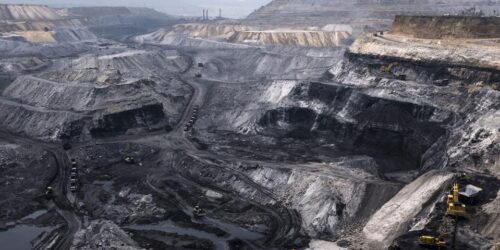Experts have said that Thar’s residents are still forced to consume water from wells contaminated with toxic waste being discharged by coal mining companies, which is in serious violation of the Sindh Environment Protection Act.
They said it in a webinar titled ‘Coal-induced Water Woes of Tharis’ held recently by the Alliance for Climate Justice & Clean Energy (ACJCE), a coalition of think tanks and civil society organisations working on energy transition in Pakistan.
A short documentary was also screened at the webinar, highlighting the ground reality and magnitude of water-related issues in Thar.
The Policy Research Institute for Equitable Development’s Azhar Lashari said that the coal rush in Thar had been depleting and poisoning the precarious groundwater resources of the region and making the lives of locals miserable.
“Percolation of toxic water from Gorano and Dukar Chaou reservoirs, lowering water table around mining sites and dumping of wastewater in farmlands have been posing a serious threat to the ecosystem and public health,” he said.
Lashari said that while the water level of the dug-wells is depleting in some villages, the sweet water of the dug-wells surrounding the wastewater reservoirs is becoming toxic. “The incidents of malarial fever and livestock casualties have significantly increased in the area,” he added.
Alternative Law Collective’s Muhammad Abdul Rafay said that the testimonies of Tharis reveal illegalities being committed by coal mining and power generation companies.
“The release of contaminated water into agricultural and grazing lands by the companies and its reinjection into underground aquifers violates the Sindh Environment Protection Act, the National Water Policy 2018 and their generation licences issued by National Electric Power Regulatory Authority,” he said.
Rafay said that Pakistan’s superior courts have repeatedly held such practices a violation of the constitutional right to life and a breach of public trust.
Two representatives from the Thar community also discussed the water-related difficulties they have been facing in the region. Rani Bheel, a female affected resident of Bitra Village, Block-II, said that the coal companies were releasing poisonous water openly with no regard to human life.
“This is also harming our livestock. More than 50 buffaloes and cows, 70 plus camels, and over 500 goats and sheep have died from drinking poisonous water,” she said
Bheel said that the clean water wells becoming saline because of the toxic water has added to the troubles of the women, as they have to arrange potable water for their households from remote places.
Sharing the harmful impacts of the dams built by these companies in the area, Ameer Hassan, an office-bearer of Thar Samaji Tehreek, said that 20 dug-wells have become saline after the development of Gorano Dam.
The local community representatives shared that more than 50 children living in the villages near Gorano Dam have died in the last few years from mosquito-borne diseases spread due to toxic water.







